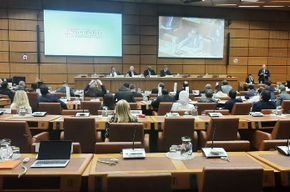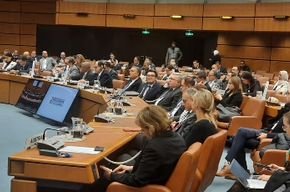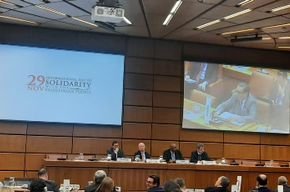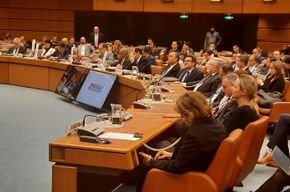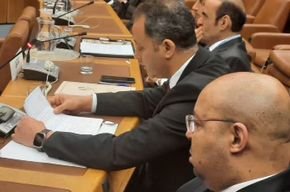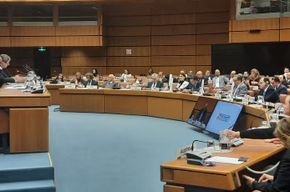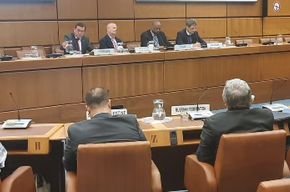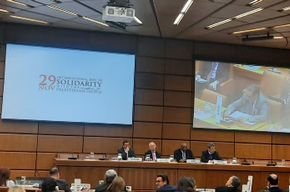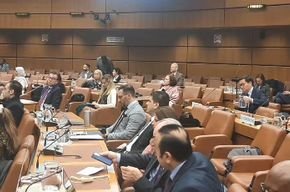The International Gathering: A Show of Support
The recent international meeting held at the Vienna International Center marked a significant milestone for global solidarity in supporting the Palestinian cause. This gathering brought together representatives from various Arab nations, as well as international supporters advocating for justice and human rights in Palestine. Participants included diplomats, activists, and leaders, all unified in their mission to promote awareness and seek an end to the long-standing grievances faced by the Palestinian people.
The atmosphere during the event was charged with a profound sense of shared determination. Attendees engaged in passionate discussions, underscoring the critical need for a united front in the pursuit of justice for Palestine. As the world continues to witness the challenges faced by Palestinians, events like this serve as a crucial reminder of the importance of international cooperation and solidarity against injustices. This gathering not only highlighted the plight of Palestinians but also emphasized the responsibility of the global community to engage actively in dialogues that seek sustainable solutions.
Moreover, the presence of a diverse group of supporters reflected a growing consensus on the need for immediate action regarding human rights violations and the ongoing struggle for statehood. Through speeches and collective actions, participants reiterated the moral imperative to uphold human dignity and ensure that the voices of the oppressed are heard. Such gatherings promote understanding and catalyze support for campaigns advocating for Palestinian rights, creating a platform for sharing information, ideas, and strategies to further the cause.
In conclusion, the meeting at the Vienna International Center stands as a testament to the power of international solidarity in addressing humanitarian issues. It brought together individuals and nations in a shared commitment to advocate for the rights and freedoms of the Palestinian people, thereby reinforcing the importance of unity in the quest for justice.
The Current Humanitarian Crisis in Gaza
The humanitarian crisis in Gaza has reached alarming proportions, particularly following a year marked by intense conflict that has devastated the region. The ongoing violence has severely exacerbated the living conditions for the Palestinian population, leading to significant loss of life and suffering, especially among the most vulnerable groups such as women and children. As documented by various humanitarian organizations, an estimated 2 million people currently reside in Gaza, with approximately 54% of the population being children, many of whom have witnessed unimaginable levels of violence and disruption in their lives.
According to recent statistics, the conflict has resulted in thousands of fatalities, with women and children representing a significant portion of those affected. Reports suggest that over 30% of the casualties have been children, underscoring the urgency of the situation and the need for immediate humanitarian intervention. The destruction of infrastructure has severely hampered access to essential services such as healthcare and education, resulting in a critical shortage of medical supplies and personnel. Hospitals that remain operational are often overwhelmed, providing care under dire circumstances, further highlighting the dire need for external support.
Additionally, the ongoing blockade has restricted access to basic necessities, including food, clean water, and sanitation facilities. A staggering 80% of the population is currently reliant on humanitarian assistance, as economic opportunities have dwindled due to the conflict. The humanitarian situation has been compounded by restricted access to aid, causing many organizations to struggle in their efforts to deliver essential services to those in need. It is evident that without concerted global efforts and immediate assistance, the suffering of the Palestinian people will continue unabated, necessitating a unified call for justice and action on their behalf.
Ongoing Violations in the West Bank and East Jerusalem
The situation in the occupied West Bank and East Jerusalem remains a cause for profound concern, marked by a series of escalating violations against the Palestinian population. The ongoing Israeli military operations are a prominent feature of this landscape, perpetuating a cycle of violence and oppression. Military incursions often result in injuries, fatalities, and mass arrests, as security forces carry out operations under the guise of maintaining order. These operations exacerbate anxieties within the Palestinian community, leading to a pervasive atmosphere of fear and instability.
Settlement expansion represents another critical aspect of the injustices faced by Palestinians in these territories. The establishment of Israeli settlements violates international law, specifically the Fourth Geneva Convention, which prohibits the transfer of an occupying power’s civilian population into the territory it occupies. This expansion not only displaces Palestinian families but also leads to the destruction of homes and properties. The act of demolition, fueled by policy objectives, results in the uprooting of communities and deepens economic hardships for those affected.
Moreover, settler violence has surged, often in tandem with state-sanctioned actions. Palestinian civilians, including children and the elderly, frequently fall victim to harassment, physical assaults, and intimidation from settlers emboldened by impunity. The lack of accountability for such acts not only perpetuates a culture of violence but also undermines trust in the rule of law. Such systematic violations call into question the integrity of international resolutions that seek to uphold human rights and advocate for a peaceful resolution to the conflict.
As the situation intensifies, it becomes essential for both local and international communities to recognize the urgent need to address these injustices. A collective voice advocating for human rights can shine a light on the plight of Palestinians enduring daily struggles amidst occupation. Only through coordinated action can justice be pursued for the affected populations of the West Bank and East Jerusalem.
A Path Forward: The Call for Peace and Humanitarian Aid
The ongoing conflict in Palestine necessitates an urgent call for peace and humanitarian aid, emphasizing the need for a ceasefire that allows both Israeli and Palestinian communities to live without the fear of violence. The international community has a crucial role in urging parties involved to cease hostilities, which can pave the way for dialogue and reconciliation. A ceasefire is not merely a cessation of violence; it is essential for fostering an environment where human rights can be respected and further discussions, including the release of hostages, can be conducted in earnest.
A long-term resolution to the conflict hinges on the development and acceptance of a two-state solution. This approach ensures both Israelis and Palestinians can have self-determination within secure and recognized borders. Such a solution is not just about territorial claims; it focuses on mutual respect and dignity, vital components that have often been overshadowed by violence and political discourse. To achieve this, both parties must be willing to engage in constructive dialogue, supported by the global community.
Organizations such as the United Nations Relief and Works Agency (UNRWA) play a pivotal role in providing necessary humanitarian support to affected populations. Their efforts in delivering food, healthcare, and education services allow Palestinian refugees to maintain a sense of normalcy, even amid turbulent circumstances. The support from international entities is crucial, not only in terms of funding and resources but also in advocating for the rights of Palestinian people and ensuring their voices are heard in global forums.
In advocating for a just resolution, it is imperative that local and international stakeholders collaborate effectively. A sustained commitment to peace, human rights, and humanitarian assistance is necessary to facilitate tangible change and foster an atmosphere where Israelis and Palestinians can coexist peacefully, safeguarding their mutual rights and advancing their shared futures.
